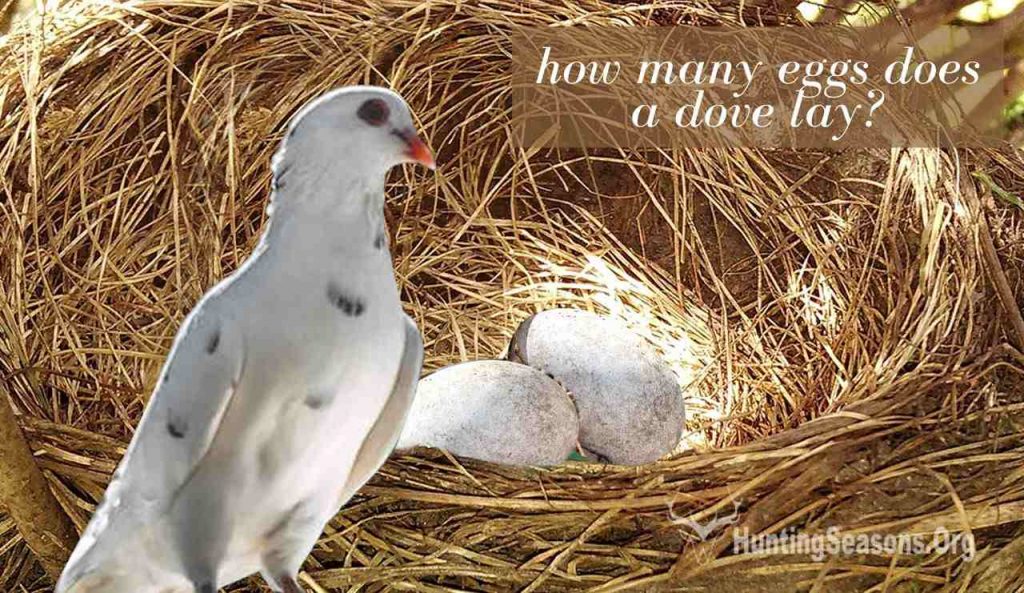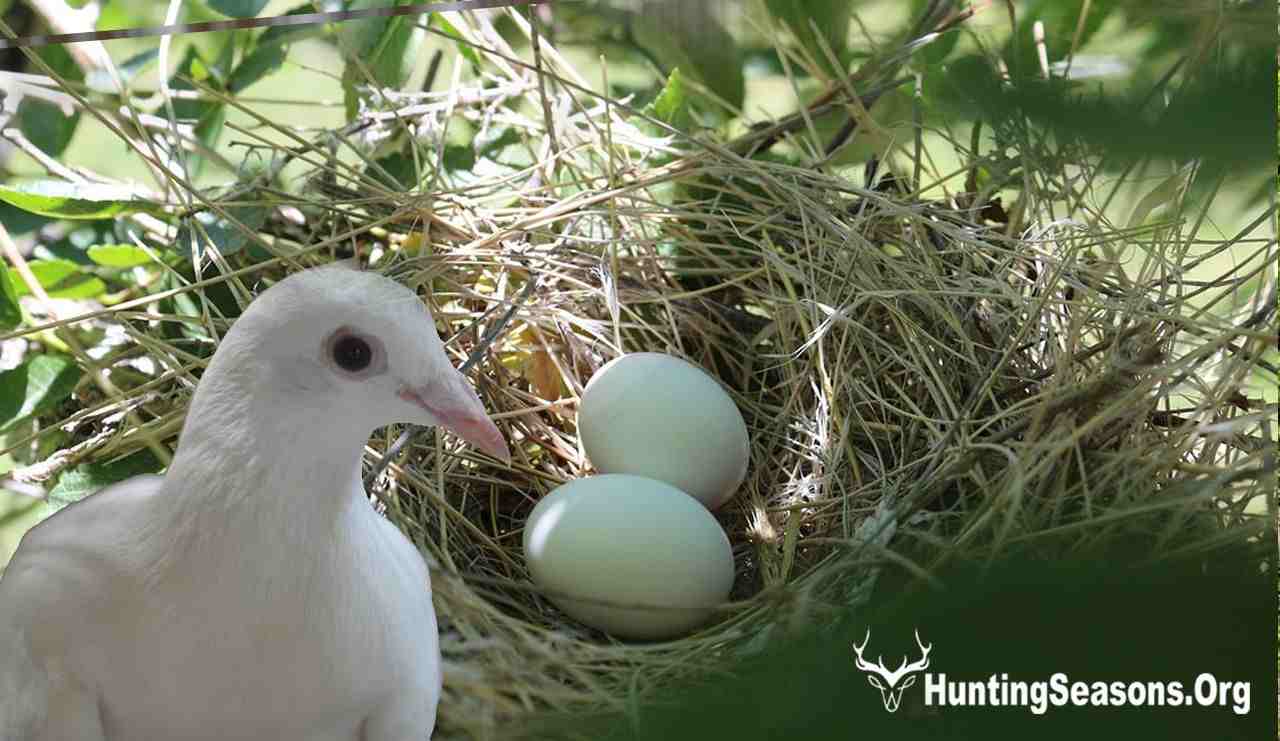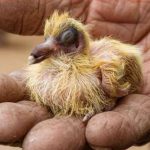With their soft coos and gentle demeanor, doves make appealing backyard visitors. Doves build flimsy platform nests in trees or on manmade structures to lay and incubate their small clutches of eggs. But how many eggs does a dove lay at one time? The number of eggs can vary based on species, age, season, and other factors. Read on to learn more about the reproductive strategy and nesting habits of different dove species.
Overview of Dove Egg Laying
Most doves belonging to the zoological family Columbidae lay two eggs per clutch, or breeding attempt. The time between eggs laid is generally a day or two. Some key points about dove egg laying:
- The number laid ranges between one to three eggs per clutch depending on resources.
- Doves are monogamous, with paired males and females sharing nest duties.
- They can raise multiple broods per breeding season, especially in warmer climates.
- Eggs are small, oval, and glossy white. Both parents incubate them for around two weeks before hatching.
- Young doves, called squabs, are altricial and require parental care in the nest until fledging.
By coordinating shared responsibilities, dove parents are able to raise multiple clutches to boost reproductive success each breeding season.

Egg Laying and Nesting Facts by Species
The number of eggs laid by doves is also influenced by their species and associated life history traits. Here is how egg laying varies for some common North American doves:
Mourning Dove
- Lays 2 creamy white eggs per clutch on average.
- Nesting attempts from March to September with 2-6 broods per season.
- Eggs incubate for 14-15 days before hatching.
Eurasian Collared-Dove
- Lays up to 4 white eggs per clutch, usually 2.
- Nesting season from March to October with up to 6 broods.
- Incubation period is 14-18 days.
White-winged Dove
- Typical clutch size is 2 eggs.
- Nesting season February to October.
- Incubation lasts 14 days.
Common Ground-Dove
- Lays 1-3 eggs, sometimes 4.
- Breeding February through August.
- Eggs hatch after 13-14 day incubation period.
The number of eggs balances mortality risk with resource availability for that dove species in its native environment. More challenging settings may limit clutch size.
Factors Influencing the Number of Eggs Laid
Several factors can cause the number of eggs laid by an individual dove clutch to increase or decrease:
- Age: Younger first-time dove parents often lay fewer eggs. Clutch size tends to increase with age and experience.
- Time of Year: Clutches may be smaller early and late in breeding season. Peak season offers maximum resources.
- Weather: Extreme hot or cold temperatures can constrain egg production. Ideal spring conditions promote bigger clutches.
- Food Availability: Access to ample food resources provides the energy needed to lay more eggs.
- Mate Health: A healthy robust mate ensures enough nutrients are provisioned to developing eggs.
- Nest Site Quality: Safe, sheltered nest sites reduce risk of egg loss.
- Predators: Higher density of predators may pressure doves to limit investment in eggs.
- Parasitism: Brood parasites usurping nests constrain number of viable eggs doves can raise.
These elements illustrate why dove clutch size is a flexible life history trait tuned to prevailing conditions. When ecological factors allow, doves will lay slightly bigger clutches to boost their productivity.
Are Multiple Doves Associated with a Nest?
While a mated pair of doves will share a single nest, other behaviors can sometimes give the impression of multiple doves tied to one nest:
- Young from previous broods may hang around the nest site after fledging begging for food.
- Males will perch and call near the nest frequently to guard mate and repel intruders.
- Females may leave the nest but remain nearby while the male incubates the eggs.
- Doves may occasionally engage in “egg dumping” by surreptitiously laying eggs in another’s nest.
However, typically only one mated pair will directly build, lay eggs in, and incubate a single dove nest at one time. The presence of additional doves near a nest is often just related to breeding behaviors.
Why Do Doves Have Small Clutches?
The modest clutch sizes of doves provide an optimal balance between producing enough young to sustain populations while expending the fewest resources per breeding attempt:
- Small eggs allow the parent doves to incubate and brood effectively.
- One or two squabs can be adequately fed and cared for by the mated pair.
- More young would rapidly deplete the nutritional reserves of the parents.
- Limited eggs reduce the impact of nest failures losing a whole clutch.
- Modest clutches enable more frequent nesting attempts per season.
- Resources aren’t wasted producing surplus young that can’t be supported.
- Fewer eggs limit detection by predators only looking for bigger clutches.
The reproductive strategy of doves evolved to maximize success by producing just the right number of eggs to reliably hatch and raise young.
Supplemental Feeding of Breeding Doves
You can support nesting doves in your yard by providing supplemental food:
- Offer a seed mix high in oils and carbs like safflower and millet.
- Provide calcium sources like oyster shell and cuttlebone.
- Supply fruits like berries and raisins for added nutrients.
- Ensure access to fresh water for drinking and bathing.
- Consider adding nest boxes or artificial nest platforms if natural sites are limited.
Helping meet the nutritional demands of breeding doves allows them to lay healthier clutches and raise more fit young each season.
The Bottom Line
Most doves lay 1-3 eggs per clutch, with 2 being typical for many species. The number invested in each breeding attempt balances costs and benefits for maximum productivity. While modest in size, dove clutches provide enough young to sustain populations when successfully repeated over an extended breeding season. Supporting nesting doves with supplemental food and sites helps sets their eggs up for success.
FAQ
How frequently do doves mate?
Doves mate in spring and summer. However, they could experience several mating seasons a year. Mating and egg-laying times vary by species and location. The female dove will lay one or two eggs every several months. Incubation takes two weeks. Each parent feeds and tends to the young.
How to tell if a dove egg is fertile?
Using a strong light, or “candling,” you can determine whether a dove egg is fertile. In candling, the egg is held to a strong light source like a flashlight to reveal its contents. Veins and the general shape of the growing embryo within the egg should be seen if the egg is fertile. A non-fertile egg will seem hollow when seen under a microscope.
How long does a dove sit on its eggs?
In the wild, the average incubation period for dove eggs is about two weeks. The male and the female dove will both take turns sitting on their clutch of eggs to keep them warm and sheltered, and they will continue to care for their young for weeks after they have hatched. How long a certain dove species will incubate its eggs depends on the dove species and environmental factors.
Can I incubate and hatch dove eggs at home?
The answer is yes; you can incubate and hatch dove eggs at home. Before doing this with doves, you should have prior experience with incubation and hatching eggs since it may be difficult to provide the necessary circumstances for the eggs to grow properly.
What do I need to incubate and hatch dove eggs at home?
Dove eggs may be incubated and hatched in a home incubator, but it must be made for that purpose. The incubator should feature a spinning mechanism to ensure that the eggs grow in a uniform environment and a consistent temperature and humidity level. You’ll also need fresh, fertile dove eggs and a brooder box or other container for the hatchlings after they hatch from the eggs.
How do I care for dove hatchlings?
Young doves should be kept warm, dry, and well-fed. A brooder box or other cage big enough for hatchlings to move around and spread their wings is required. In addition, you must provide them with commercial dove starter feed or cooked grains and seeds. To maintain the hatchlings’ water clean and healthy, it should be replaced often.
Sources
The Cornell Lab of Ornithology
- 2024 Washington Hunting Season New Dates & Regulation! - July 27, 2024
- Virginia Hunting Seasons 2024 Latest Dates & Regulations - July 22, 2024
- Georgia Hunting Season 2024-2025 [Updated Schedule!] - July 19, 2024





